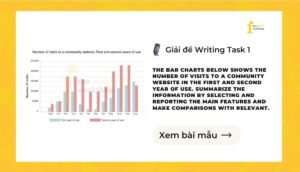Trong chuyên mục Giải đề IELTS Writing Task 2 tuần này, thầy Đỗ Thành – giáo viên tại The IELTS Workshop sẽ cùng bạn khám phá chủ đề a 4-week holiday nhé!
1. Phân tích đề bài
1.1. Đề bài
Employment should give their staff at least a 4-week holiday a year to make employees better at their jobs. To what extend do you agree or disagree?
(Người sử dụng lao động nên cho nhân viên của mình ít nhất 4 tuần nghỉ phép mỗi năm để giúp họ làm việc hiệu quả hơn. Bạn đồng ý hay không đồng ý ở mức độ nào?)
1.2. Phân tích đề bài
Dạng bài: Opinion essay
Từ khóa chính: employment; holiday
Xem thêm: Cách làm dạng Opinion essay IELTS Writing task 2
1.3. Dàn bài chi tiết
Introduction
Context
Restate the topic: It is argued that a minimum four-week holiday should be standard to improve job performance.
Thesis: Acknowledge the benefits for employee productivity but argue that the policy is not suitable for all businesses and requires selective application.
Body paragraph 1: Agreement – benefits of an extended holiday
An extended holiday period can lead to better employee performance.
#1:Prevents burnout and improves mental health.
- Continuous work causes stress; A four-week break allows disconnect, recharge, and return with renewed energy.
#2: Fosters creativity and enhances problem-solving skills.
- new perspectives and insights to their job.
- Creatives in the advertising sector: find new inspiration, leading to better ideas upon their return.
Body paragraph 2: Disagreement – drawbacks and need for selectivity
A mandatory four-week holiday is not a universally viable solution for all types of businesses.
#1: Detrimental for young start-ups.
- small, essential teams; long absence; halt projects, disrupt workflow, and threaten the company’s survival.
#2: Unfeasible for firms in financial difficulty.
- The cost of covering an absent employee; unsustainable financial burden.
- The policy must be applied with discretion.
Conclusion
2. Bài mẫu
The demands of the contemporary workplace have brought the issue of employee well-being and its connection to productivity to the forefront. It is often argued that companies should grant their employees a minimum of four weeks of annual leave to enhance their job performance. While I agree that a 4-week holiday can significantly boost a worker’s productivity, I also believe this policy is not beneficial for all firms and should therefore be implemented selectively.
There are compelling reasons why an extended holiday period can lead to better employee performance. Firstly, a substantial break is crucial for preventing burnout and, therefore, improving mental health. Continuous work without adequate rest can lead to chronic stress, diminished focus, and a decline in motivation. A four-week leave, on the other hand, allows individuals to mentally recharge from their professional responsibilities, mentally recharge, and return to work with renewed energy and a clearer perspective. Secondly, such a break can effectively foster creativity and enhance problem-solving skills. When employees have time to travel, pursue hobbies, or simply experience life outside of their job, they gain new insights and perspectives that can be applied to their work, leading to more innovative solutions and a higher quality of output. A prime example for this can be seen in the advertisement sector, where staff are under mounting pressure to create and innovate. A temporary leave from work, maybe to pursue a new hobby or to travel to a novel destination, can potentially allow these marketing creatives to replenish their ideas, and become more adept at their job as they return to their work after the break.
However, a mandatory four-week holiday policy may not be a universally viable solution, particularly for certain types of businesses. For instance, young start-ups often operate with a small, core team where every member is integral to daily operations. The absence of a key employee for an entire month could halt critical projects, disrupt workflow, and place an unsustainable burden on the remaining staff, potentially jeopardizing the company’s survival in its crucial early stages. Furthermore, firms experiencing financial difficulties would struggle to implement such a policy. The cost of covering an absent employee’s duties, whether by hiring temporary staff or paying overtime, could impose a severe financial strain that outweighs the long-term benefits of improved productivity. Therefore, I maintain that this policy should be applied with discretion, taking into account the specific context, size, and financial health of the organization.
In conclusion, while the advantages of a four-week annual holiday on employee effectiveness are clear, for new ventures and financially unstable companies, a mandatory month-long leave could present tremendous operational and financial challenges.
Sample 8.0 by Do Quang Thanh– IELTS Teacher at The IELTS Workshop
3. Vocabulary and collocations
- contemporary workplace: môi trường làm việc đương đại
- employee well-being: sự an lạc/hạnh phúc của nhân viên
- to enhance job performance: nâng cao hiệu suất công việc
- to be implemented selectively: được thực thi một cách có chọn lọc
- compelling reasons: những lý do thuyết phục
- prevent burnout: việc ngăn chặn tình trạng kiệt sức
- chronic stress: căng thẳng mãn tính
- diminished focus: sự tập trung suy giảm
- to mentally recharge: nạp lại năng lượng tinh thần
- to effectively foster creativity: nuôi dưỡng/thúc đẩy sự sáng tạo một cách hiệu quả
- innovative solutions: các giải pháp mang tính đổi mới
- mounting pressure: áp lực ngày càng tăng
- to replenish ideas: làm đầy lại/bổ sung các ý tưởng
- a viable solution: một giải pháp khả thi
- integral to daily operations: không thể thiếu cho các hoạt động hàng ngày
- to halt critical projects: làm đình trệ các dự án quan trọng
- an unsustainable burden: một gánh nặng không bền vững
- to jeopardize: gây nguy hiểm, đe dọa
- financial strain: gánh nặng về tài chính
- to be applied with discretion: được áp dụng một cách thận trọng
Xem thêm: Cách học từ vựng IELTS hiệu quả từ thầy Đặng Trần Tùng 9.0
Tạm kết
Mong rằng bài viết mẫu trên đã mang đến cho bạn một góc nhìn toàn diện và cách triển khai mạch lạc cho dạng bài Opinion trong IELTS Writing Task 2 với chủ đề a 4-week holiday
Đừng quên theo dõi chuyên mục [Cập nhật liên tục] Tổng hợp đề thi IELTS Writing 2025 kèm bài mẫu và Bài mẫu Writing Task 2 để củng cố thêm kiến thức và kỹ năng xử lý dạng bài này
Đăng ký ngay HỌC IELTS MIỄN PHÍ tại Website của The IELTS Workshop để luyện tập cùng các giáo viên giàu kinh nghiệm và nhận được hướng dẫn cụ thể hơn nhé!









